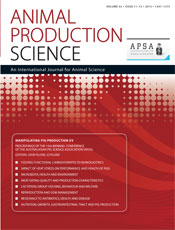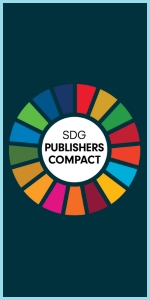
Animal Production Science
Volume 55 Numbers 11 & 12 2015
Manipulating Pig Production XV
Driven by major concerns of animal welfare non-government and consumer organisations, stakeholders of the European pig chain realised that castration of males without anaesthesia is outdated. Therefore, an ambitious objective was formulated to completely abandon castration of male pigs by 2018. This article discusses the challenges that the European pig industry is facing, where solutions were found and what still needs to be done to succeed.
AN15276Feed non-starch polysaccharides for monogastric animals: classification and function
This paper presents a review on the various terms used to describe ‘fibre’ in feed, such as crude fibre, acid detergent fibre, neutral detergent fibre and dietary fibre and what chemical entities they actually represent. It questions the relevance of ‘crude fibre’ in feed formulation for monogastric animals.
AN15278Dietary fibre and crude protein: impact on gastrointestinal microbial fermentation characteristics and host response
The gastrointestinal tract of pigs contains a large microbial ecosystem. Providing fermentable substrates to the gut microorganisms is coming more and more into the focus in order to prevent intestinal disease and improve animal performance. The article summarises the current knowledge regarding the use of selected fermentable carbohydrate sources and dietary proteins level on the gut microbiota and the animal.
AN15277Functional short-chain carbohydrates (prebiotics) in the diet to improve the microbiome and health of the gastrointestinal tract
Understanding the role bacteria plays in the health of the gastrointestinal tract is an expanding area of research. Manipulation of specific dietary factors may be essential to both favourably influence the gastrointestinal environment and also select for growth of beneficial bacterial species. Key dietary factors attracting greater research attention in both human and pigs are naturally occurring prebiotic carbohydrates.
AN15267Physiological consequences of heat stress in pigs
Heat stress negatively influences animal agriculture and swine production efficiency is no exception. Understanding the metabolic, reproductive, and epigenetic mechanisms through which heat stress impairs pig production is essential to the development of mitigation strategies that can be used to overcome the deleterious effects of heat stress on animal agriculture.
AN15255Nutritional strategies to alleviate heat stress in pigs
Due to increasing frequency and severity of heat waves and trends for increasing tropical production, management of heat stress in pigs is both a current and emerging issue. This has resulted in renewed focus on amelioration strategies and recently there have been advances in the understanding of how nutrition can be optimised to reduce the effects of heat stress. It is the goal of this review to discuss these advances in the context of pig production.
AN15280The impact of heat stress on intestinal function and productivity in grow-finish pigs
Heat stress antagonises pig production and well-being. This review will discuss how the early onset of heat stress alters intestinal integrity and function in growing pigs and the contribution this has on reducing growth performance. By understanding these early changes, better nutritional management strategies can be developed to improve pig performance and well-being over the summer months.
Current sow management concentrates, in part, on early abrupt weaning of piglets to maximise sow productivity. The opportunity exists for pig producers to modify current management practices for the betterment of both piglet and sow welfare. This review identifies strategies to mate sows in lactation that could be included in management systems, allowing for later and more gradual weaning and reduced sow confinement.
AN15271Under what conditions is it possible to produce pigs without using antimicrobials?
Antimicrobial use in animal agriculture has come under increasing scrutiny and the pig industry is keen to move away from routine use of antimicrobials. This article describes reasons for historical and current use of antimicrobials in the pig industry and methods currently known to reduce or eliminate their use. The high level of technical understanding and innovation common in the pig industry will help to position it as a leader in this endeavour.
Antimicrobial stewardship (AMS) is a new term for an old idea, that of instilling and ensuring the rational prescribing of antimicrobials. It is based on the concept of confining antimicrobial use to indications where the benefits are proven and substantial, with the stated aim of minimising the pressure for selection of antimicrobial resistances. A structured approach to stewardship involves seven basic requirements: ‘executive’ ownership, consensus prescribing guidelines, a local formulary, a local champion or champions, authority to intervene at the time of prescription, authority for measurement of use, and access to reliable laboratory services.
AN15275Selection for productivity and robustness traits in pigs
Selection emphasis is continuously extended in pig breeding programs worldwide to include both productivity and robustness of pigs. This review summarises opportunities and challenges for genetic improvement of consistent performance of pigs in various environments and health status of pigs. This information is useful for breeding companies as well as pork producers who want to optimise performance and health status of pigs on farms.



